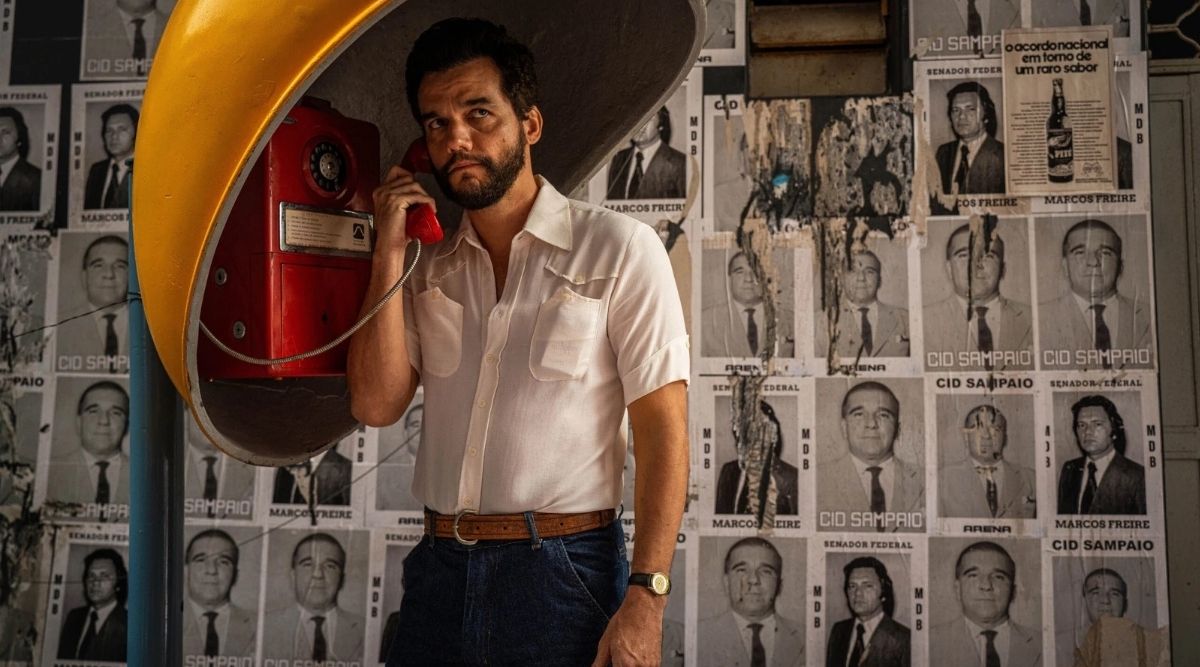On the surface, Kleber Mendonça Filho’s The Secret Agent reads as typical awards bait. It’s a political drama set during an oppressive period of history that reckons with the open wounds of horrors past with a sombre, tragic touch. Look no further than last year’s Brazilian Oscar entry, I’m Still Here, which is also set during Brazil’s Military Dictatorship.
But from its opening moments—a patient, lived-in vignette involving a gas station, a rotting body, and a couple of corrupt cops—it becomes apparent that The Secret Agent is less interested in being an overarching document of its era than it is in being a messy, vibrant tapestry of a people. Across 158 minutes, Filho’s film fervently clutches at the fabric of Brazilian history, culture, and folklore.
Unfolding at a leisurely pace, The Secret Agent eschews the conventions of its political thriller setup to manifest as a living, breathing cinematic novel, brimming with warmth, texture, and detail in each bustling frame. The fleeting conversations of a world-wise grandmother, the beading sweat of open-shirted plotters, and the rollicking humdrum of Carnival all entwine to create a film that you can smell and taste.
Wagner Maura rises to star status in The Secret Agent.
The movie is bursting with complete lives and stories that extend beyond its sun-soaked frames. With The Secret Agent, Filho crafts a loving reclamation of historical and romanticized truth, one that not only relishes Brazil’s colourful and tattered past but painfully reckons with the lasting scars of the period.
Wagner Moura stars as Marcelo, a dissenting technology researcher on the run in 1977, during Brazil’s infamous military regime. He heads to the northern city of Recife—Filho’s hometown and the subject of his essay film Pictures of Ghosts. There, he seeks asylum and the company of his young son. Arriving during Carnival, Marcelo is welcomed into a community of fellow political refugees; however, an air of paranoia, intrigue, and violence prevails.
As Marcelo begins working at the state identification archives, where he hides and searches for his deceased mother’s ID card, danger and corruption encircle him. After finding out a gaggle of hitmen is after him, he scrambles to find a way out of the country. Told in three parts and alternating between the past and present, The Secret Agent becomes as much a portrait of ’70s Brazil as it is a playful meditation on the fragility of memory and truth under authoritarian rule.
The Secret Agent marries disparate visuals and tones into an exquisite memory piece.

Moura rises to star status in The Secret Agent. Armed with an ingrained sense of melancholy, Moura’s painfully natural performance feeds off subtle inflections and mannerisms to conjure a man at the end of his rope. Operating at a crossroads between disillusionment and hope, Moura routinely finds poetry in each small smirk and defeated glance. But it’s Tânia Maria’s Dona Sebastiana who steals her respective scenes, emanating an infectious spirit with each long-winded reminiscence.
Along with cinematographer Evgenia Alexandrova, Filho steeps The Secret Agent in the visual flair and style of the 1970s. Shot with Panavision Anamorphic lenses and vintage equipment, the film unfurls as an intoxicating, messy mosaic. Conversations authentically overlap and multiple storylines develop and entwine simultaneously.
Stunning, isometric tableaus and painterly slow zooms zap a bygone Brazil back to life. Set to the tune of an assortment of Tropicália ditties, The Secret Agent not only astonishes as a bittersweet exercise in evocation but also as a stirring treatise on fiction and film as a vital catalyst for memory.
It all filters into an experience that brims with an unabashed, playful love for the cinematic tradition. From hysterical acts of indecency during screenings of Jaws and The Omen to a schlocky detour about a severed leg attacking gay lovers, The Secret Agent is marked with tonal departures that would sink any film with its artistic ambitions. But in Filho’s hand, such segues evolve into folkloric literary devices that obliterate the line between urban legend and bitter truth. It’s all part of a film that looks the part of a political thriller but survives as an exquisite memory piece.
Everything builds to a heart-stopping but lyrically subdued climax that supposes fiction not as a means of erasing truth but of distilling it. In this way, The Secret Agent‘s colourful, fictional tale carves out a bittersweet slice of veracity out of Brazil’s tumultuous history—a slice many are still neglecting to embrace. After all the record books are wiped, the entries deleted, and our top leaders in full denial, all we can hope for are stories of our past to help light the path forward.
The Secret Agent played as part of the Toronto International Film Festival.
The Secret Agent
-
Rating - 9/109/10
TL;DR
The Secret Agent‘s colourful, fictional tale carves out a bittersweet slice of veracity out of Brazil’s tumultuous history—a slice many are still neglecting to embrace.







